





- July 24, 2023
- 127 Views
Blockchain technology and web development are two powerful innovations that have the potential to transform our world. While they may appear distinct, they share similarities and can work together to create groundbreaking solutions.
In fact, several organizations have already started leveraging the benefits of both the technologies. This is why the demand for web app development companies in India has increased immensely.
In this blog post, we will delve into the differences between blockchain technology and web development and explore how they intersect and complement each other.
Understanding Blockchain Technology
Blockchain technology is a decentralized digital ledger that securely records transactions. It operates through a network of interconnected nodes collaborating to validate and authenticate transactions.
Once verified, a transaction is added to the blockchain and becomes immutable, meaning it cannot be altered or erased. The advantages of blockchain technology can be summarized as follows:
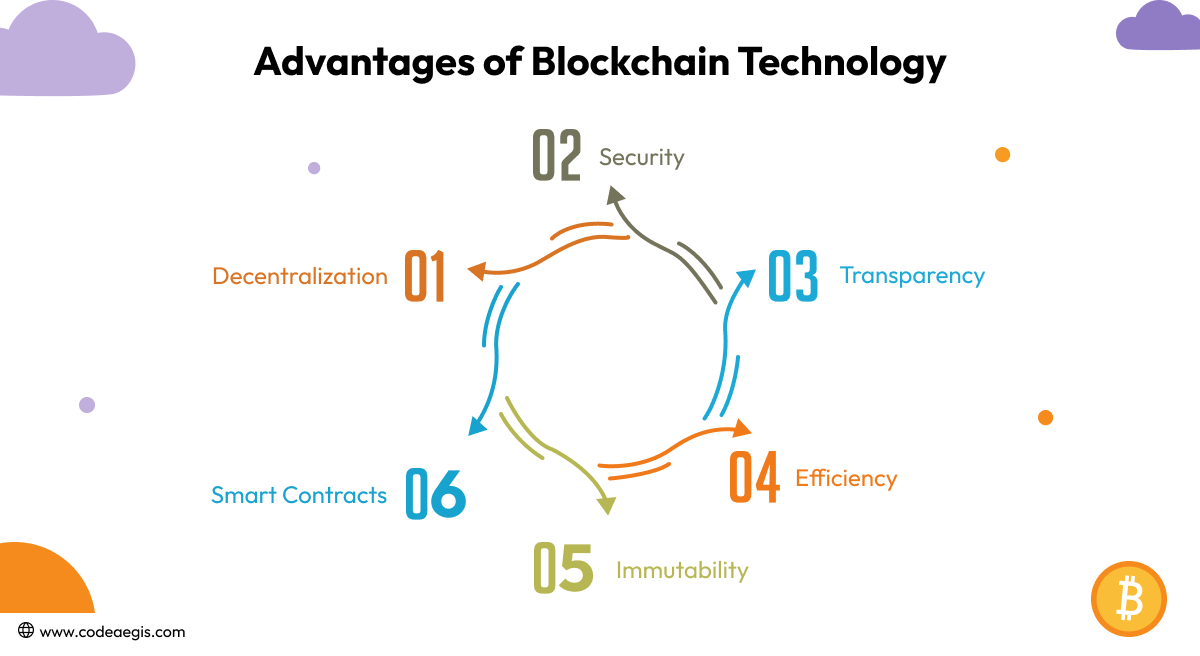
- Decentralization: Blockchain technology eliminates the need for a central authority, such as a bank or government, to oversee and validate transactions. Instead, it relies on a network of interconnected nodes that work together to verify transactions.
This decentralized approach fosters greater transparency and trust among participants since no single entity controls or can manipulate the system. - Security: The decentralized nature of blockchain makes it highly secure. Each transaction is encrypted and linked to the previous transaction, forming a chain of blocks.
Altering a transaction would require changing all subsequent blocks, which is computationally infeasible due to the consensus mechanism employed by the network.
Consequently, blockchain technology provides a robust and tamper-resistant system for recording and storing data. - Transparency: Every transaction recorded on the blockchain is visible to anyone accessing the network. This transparency promotes accountability and trust since all participants can independently verify transactions and ensure their integrity.
It is precious in industries where transparency is crucial, such as supply chain management and finance. - Efficiency: Blockchain technology eliminates intermediaries, such as banks or brokers, from the transaction process. This streamlines the process and reduces costs associated with third-party involvement.
By removing unnecessary intermediaries, blockchain technology enables faster and more direct peer-to-peer transactions. - Immutability: Once a transaction is recorded on the blockchain, it becomes permanent and cannot be altered or deleted. This immutability ensures that the transaction history remains intact and verifiable.
It is beneficial when data integrity and audibility are critical, such as in financial transactions or legal contracts. - Smart Contracts: Smart contracts are self-executing contracts with the terms of the agreement directly written into the code on the blockchain. These contracts automatically execute and enforce predefined conditions when specific criteria are met.
Smart contracts improve efficiency by eliminating the need for manual enforcement and reducing the risk of fraud or manipulation. They are widely applicable in various fields, including supply chain management, insurance, and decentralized finance.
Exploring Web Development
Web development encompasses designing, building, and maintaining websites, web applications, and other digital solutions. It requires a blend of technical skills, including coding, scripting, design, project management, and communication abilities.
In today's digital era, web development has become increasingly crucial as businesses and individuals rely on websites and web applications to engage with their audiences and accomplish their objectives. The benefits of web development can be summarized as follows:
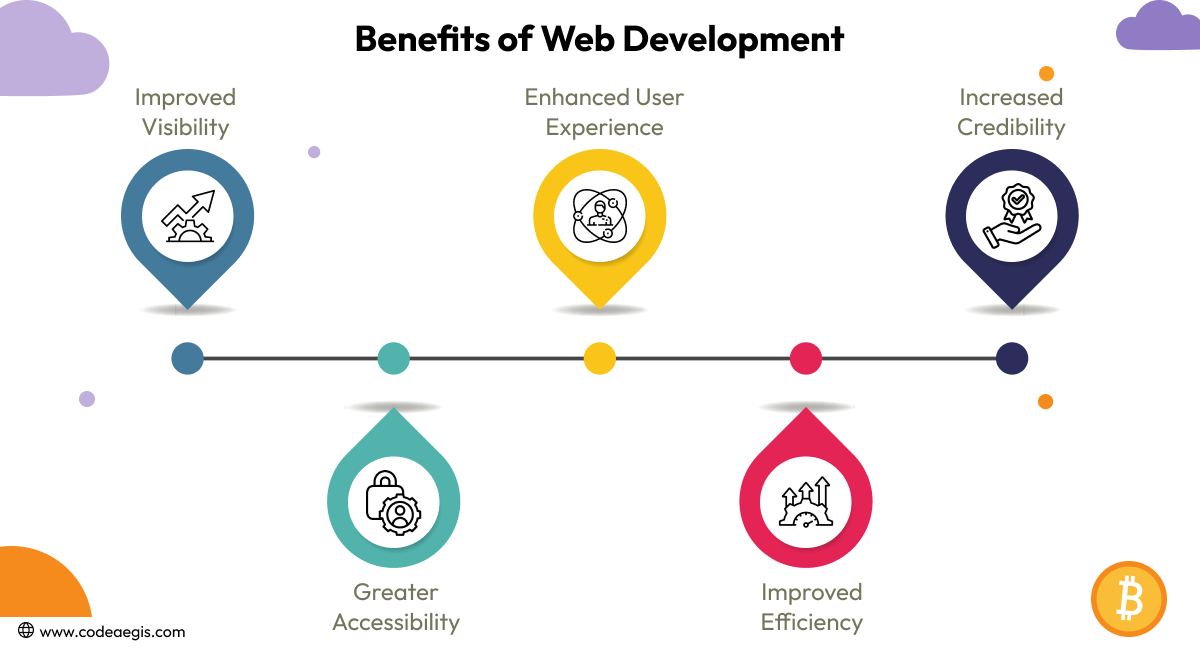
- Improved Visibility: A well-designed website helps increase online visibility by making your business or content easily discoverable through search engines.
By utilizing search engine optimization (SEO) techniques, you can optimize your website's visibility and attract more visitors, potentially leading to increased exposure and opportunities. - Enhanced User Experience: User experience (UX) focuses on creating websites or applications that are intuitive, easy to navigate, and visually appealing.
By providing a smooth and enjoyable user experience, you can keep visitors engaged, encourage them to explore further and increase the chances of achieving your desired outcomes, such as conversions or sales. - Increased Credibility: A professionally designed website reflects positively on your brand or business. A visually appealing and well-structured website can instill trust in your audience, giving them confidence in your products, services, or expertise.
It establishes credibility and positions your brand as a reliable and trustworthy entity in your industry. - Greater Accessibility: Web applications provide the advantage of being accessible from various devices, such as computers, smartphones, and tablets, as long as there is an internet connection.
This accessibility allows a broader audience to access your content or services, regardless of location or device. It enables you to reach and engage with more potential customers or users. - Improved Efficiency: Custom web applications tailored to specific business needs can streamline processes and improve efficiency. Automation, data management, and integration with other systems can simplify tasks, reduce manual effort, and enhance productivity.
By optimizing workflows and operations, web applications can contribute to more efficient and effective business management.
How Blockchain and Web Development Combine to Enhance Security?
The intersection of blockchain and web development can boost security and trust in various ways. Here are five use cases that highlight the advantages:
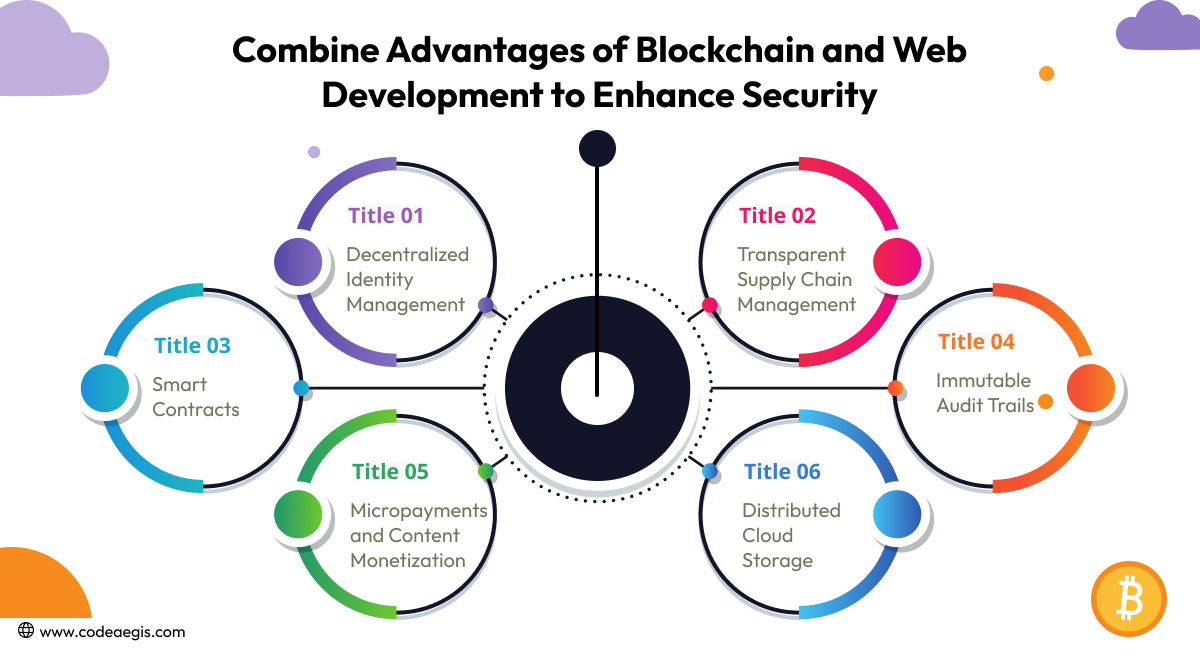
- Decentralized Identity Management: Blockchain can enable a decentralized identity system where users have control over their data.
This can prevent identity theft and data breaches associated with centralized databases.
Users can verify their identities securely and share specific information only when required, enhancing privacy and trust in online transactions. - Transparent Supply Chain Management: Blockchain technology can be utilized to track and verify the provenance of goods throughout the supply chain.
By recording every transaction and movement on an immutable blockchain ledger, businesses can ensure transparency and authenticity, preventing counterfeiting and unauthorized alterations.
This increases trust among stakeholders and empowers consumers to make informed purchasing decisions. - Smart Contracts: Blockchain-based smart contracts facilitate self-executing agreements with predefined conditions. These contracts are transparent, tamper-proof, and enforceable without intermediaries.
By incorporating smart contracts into web development, organizations can streamline processes, automate tasks, and reduce the risk of fraud or manipulation, fostering trust between parties. - Immutable Audit Trails: Blockchain's decentralized and immutable nature makes it an ideal tool for creating transparent audit trails.
By integrating blockchain into web applications, organizations can maintain a tamper-proof record of critical activities, such as financial transactions, data modifications, or user interactions.
This audibility enhances security, as unauthorized or suspicious activity can be easily identified and investigated. - Micropayments and Content Monetization: Blockchain-based cryptocurrencies, such as Bitcoin or Ethereum, enable secure and efficient micropayments on the web.
Content creators can leverage this technology to monetize their work directly, eliminating intermediaries and reducing transaction costs.
Users can trust that their payments are secure, while content creators have more control over their intellectual property and revenue streams. - Distributed Cloud Storage: Combining blockchain and web development can create a decentralized and encrypted cloud storage system. Instead of relying on a single server, files are fragmented, encrypted, and distributed across a blockchain network.
This enhances data security and availability, as no central authority controls the entire dataset. Users can trust that their data is stored securely and is less prone to hacking or unauthorized access.
How to CodeAegis can Help you In Building a Blockchain Web App?
At CodeAegis, we are committed to comprehensive assistance in building blockchain web applications that prioritize security, trust, and innovation.
Our seasoned blockchain developers have deep expertise and hands-on experience in leveraging blockchain technology for web development. We stay updated with the latest advancements in the field, ensuring we deliver cutting-edge solutions to our clients.
One of our key strengths lies in offering customized solutions tailored to the unique requirements of each project. We believe in a collaborative approach, working closely with our clients to thoroughly understand their specific needs, business goals, and target audience.
This allows us to design and develop blockchain web applications that align perfectly with their vision, ensuring optimal functionality and user experience.
Conclusion
As web development evolves, integrating blockchain technology offers a promising path toward increased security and trust.
By leveraging blockchain networks' immutability, transparency, and decentralization, blockchain app developers can build applications that protect user data, prevent fraud, and foster trust between parties. If you want to know more about it, leave your comments here. Also, if you are looking for a trusted Blockchain app development company, CodeAegis is here to help.
FAQs
How does blockchain enhance security in web development?
Blockchain enhances security in web development by providing decentralization, immutability, and cryptographic encryption. It eliminates single points of failure, reduces the risk of data tampering, and enables secure peer-to-peer transactions.
Can blockchain ensure trust in web applications?
Yes, blockchain ensures trust in web applications through transparency and verifiability. The distributed ledger records all transactions and actions, allowing users to independe
What are the key tools for blockchain web development?
- Ethereum
- Solidity
- Web3.js
- FrameWorks
Some key tools for blockchain web development include Ethereum, Solidity (smart contract language), Web3.js (JavaScript library for interacting with the blockchain), and frameworks like Truffle and Remix for development and deployment.
About Author
You May Also Like

Do you want to build a simple app for your business? Do you want to create an app that enhances the experience of users who play games on their smartphones? Whatever your reason, I have created this g

Prime Minister Narendra Modi eventually launched 5G in India at the 6th edition of the IMC (India Mobile Congress). Reliance Jio and other telecom organizations documented the various use cases of 5G

The two hottest frameworks in the mobile app development world are Flutter and React Native. They’re both cross-platform solutions that allow you to write code once and deploy it to Android and

Augmented Reality and Virtual Reality are the two leading buzzwords in the technology era. What began as a completely new, significantly different technology has rapidly revolutionized into something

Summary: Car rental apps have become the heart of the business, stimulating growth, efficiency, and customization. They offer updated rental methods to stay relevant with Gen Z and Millennials, who ar

Gone are the days when people used to wave down a taxi on the street or wait for one at the airport. With the advent of technology, people can now book a taxi with just a few taps on their smartphones

Businesses these days are looking to have an edge over their competition by having a strong online presence. A website is not enough anymore, and many companies are turning to mobile apps as a way to

Over the past decades, the healthcare sector has continuously expanded its wings, moving from traditional to advanced technological processes. This evolution is driven by the sector's unwavering commi

Do you run your own business and want to build an Android app? If yes, you must know about the latest technology trends playing a significant role in the android app development process. Technology i

Generative AI? Is this still a question mark to you? If you don’t know what generative AI does, that would be a fair question, but it was not if you said that you haven’t interacted with

Mobile applications play a vital role in the development of multiple businesses in this digital world. Most companies are investing in iOS app development to strengthen their market appearance and dra

Nowadays, the financial industry has encountered massive digitization, and mobile apps play a significant role in it. There are a wide variety of money transfer apps available, catering to the needs a

Did you know that Dubai's prime residential market is projected to experience the world's strongest growth in 2025? The Middle East is buzzing with opportunities, especially in the realm of mobile app

Nowadays, the digital presence has revolutionized business dynamics. App development is not just evolving but breaking traditional barriers and emerging as strong and progressive solutions. With robus

Have you ever found yourself in a situation where you desperately needed a product or service but didn't have the time or energy to go out and get it? Well, fear no more because on-demand delivery app

In the last few years, wearables have become increasingly popular. Fitness trackers, smartwatches, and even smart glasses are becoming more and more commonplace. And as the technology improves and bec
The beacon technology market was valued at 519.6 million U.S. dollars in 2016, and it was estimated to increase at a CAGR of 59.8% to reach about 56.6 billion U.S. dollars in size in 2026. Throughout

Businesses after COVID are going through several changes, and the food industry is no different. Restaurants that have been doing dine-in are now struggling to keep up with the demand for delivery and

When it comes to mobile app development, one of the most important things you need to consider is the prototyping process. This will allow you to create a working model of your app so that you can tes

As we head into the future, more and more people are looking to find ways to improve their healthcare. And with good reason - healthcare can be expensive, and it can be difficult to get the right care

Lately, the tech world has been abuzz with talk of the Metaverse, a groundbreaking concept that promises a shared virtual space where people can interact and engage with one another. This futuristic i
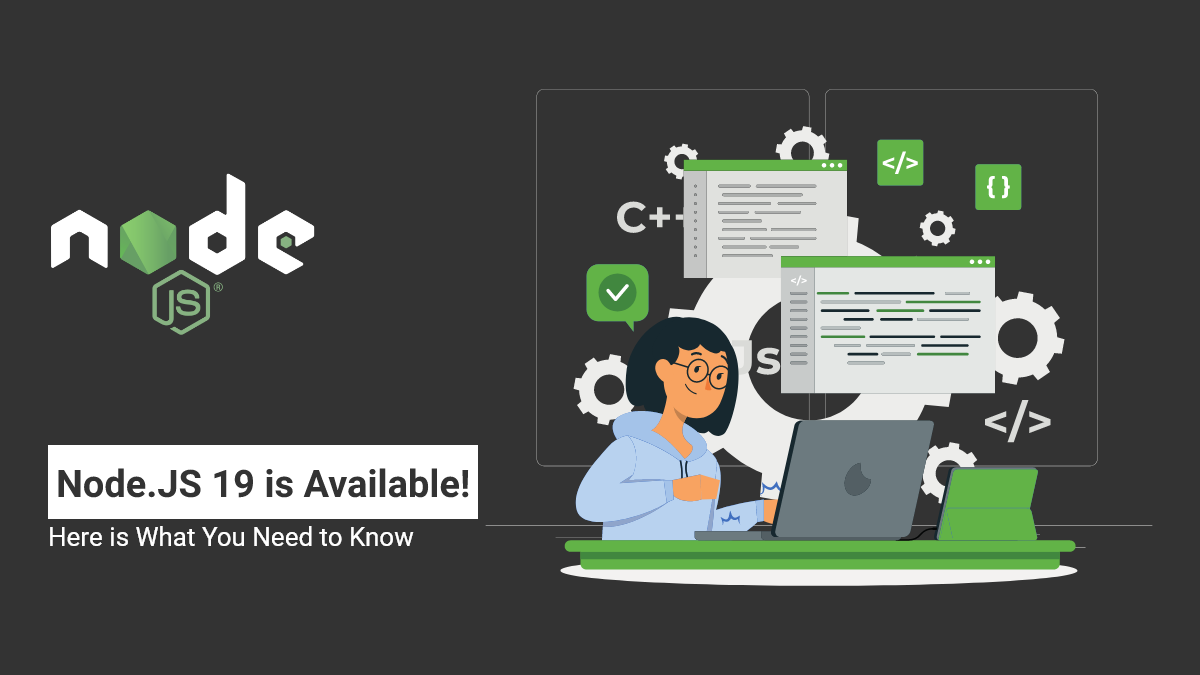
The launch of Node.js 19 is now available! It substitutes Node.js 18 as the current launch line, with Node.js 18 being encouraged to long-term support (LTS) next week. What do these two launches mean

Imagine a classroom where history comes alive in the 3D model of historical events. Biology students can explore the unique complexities of a cell as they have practiced it with real-world examples, a

The mobile app market has grown to a staggering size, with over 1.8 million apps available in the Google Play Store and Apple App Store combined. Mobile apps have become a necessity for people worldwi

Australia is moving towards a big shift at a global level. It is strengthening the ties at the B2B level and becoming a hub for innovation, sustainability, and digital transformation. Backed with a r

Sipping coffee and thinking of a startup has always been trendy. Similarly, hanging out with friends and promising them to start a business someday feels refreshing. Did you know that several success

In today's digital world, businesses must keep up with ever-increasing consumer expectations and find new ways to engage their audience. That's where Progressive Web Apps (PWAs) come in. PWAs are a r

The UAE, and Dubai specifically, has really evolved from just a real estate and tourism market, and is quickly becoming a hub for digital innovation and online commerce. With the continued investment

Decentralized Finance (DeFi) is a modern and evolving region of finance that is less centralized and more open to innovation and collaboration. DeFi enthusiasts laud its prospect of disrupting convent

With the advent of technology, the financial industry has experienced a massive transformation in the past few years. Fintech applications have revolutionized the way we manage and invest our money.

You’ve likely heard the term “Artificial Intelligence” or AI until now—It’s 2025. But have you ever paused to consider how deeply AI has woven itself into the web of our

Google released Android 13 beta 4 to the public, and with it comes a slew of new features and updates. In this article, we'll walk you through everything you need to know about the latest version of A

Mobile applications have dominated the market, helping businesses to reinforce their full potential. Not only for the rental business, but mobile apps play a critical role in establishing a solid foun

The food delivery application has innovative, game-changing features that will transform the industry from the bottom to the top. According to Statista, the online food delivery market in the UAE has

Blockchain technology and web development are two powerful innovations that have the potential to transform our world. While they may appear distinct, they share similarities and can work together to

Are you looking to design a mobile app in 2025? Mobile application development is an ever-changing field, and it can be hard to keep up with the latest trends and best practices. But with this guide,

The gaming industry is proliferating with the advent of smartphones and PCs. Every age group, from children to adults, is well-engaged and fond of online gaming. The rapid evolution of mobile gaming a

Rental businesses are gaining market share by offering essential services that help other businesses minimize downtime and maximize profitability. This growth trend is particularly strong in the servi

As blockchain technology continues to evolve, so too does the landscape of projects built on its foundation. The worldwide Blockchain market is predicted to expand at a CAGR of 42.8% (2018-2023), dire

Will DeepSeek and ChatGPT collide in the race for AI Supremacy? DeepSeek and ChatGPT are at the center of a heated debate that tends to shape the future of AI. The real-world implications and effecti

Depending on what niche you’re in, video chat apps are becoming increasingly common in the world of business and technology. Whether it’s a small startup company or a multinational corpora

Building an App that promotes businesses and acts as a right hand has a separate fanbase! Creating an app for the business plays a fundamental role in elevating business operations, making seamless c

Blockchain technology has been a hot topic recently due to its potential to revolutionize various industries. Blockchain is a distributed ledger technology that ensures transparency, security, and dec

Are you aware that the world is going through a significant shift in the way we make payments? According to a recent report by Deloitte, the total value of digital payments worldwide is estimated to r

The startup space is fast, competitive, and harsh. According to Exploding Topics, about 90% of startups fail. What would be the reason for that? There would be multiple reasons for startup failure, bu

Things have changed dramatically over the years with new opportunities, techniques, and future advancements. Real estate is the best industry to invest in, though the procedure sometimes irritates. Me

Table of Contents 1. What is Flutter? 2. Why Choose Cross-Platform Development? 3. Why is Flutter the Best Platform to Make Cross-platform Applications? 4. How Much Does it Cost to

Can you give thought to a week without coffee breaks at cafes? It might not be possible, but earlier, having coffee outside the house was never a thing. So how the tables have changed the corners?

Do you know what digital transformation with AI is and how it can impact your business? Organizations today are under pressure to digitally transform to stay competitive. This digital transformation

Over-the-top (OTT) platforms like Disney Plus, Netflix, and Prime Video have gradually captured attention as traditional TV-watching methods have faded. Throughout the year, OTT platforms have created

When it comes to developing an app, there's a lot to consider. Not only do you need to create a user-friendly interface and design, but you also need to make sure your app is able to meet the demands

Want to establish a new business or improve an existing one? You should consider using blockchain technology Being a distributed database, Blockchain allows for secure online transactions. This techn

Social media apps are all the rage these days. People use them to connect with friends and family, to learn about new products and services, and to stay up-to-date on the latest news. But as popular a

The world of gaming is rapidly evolving, and the latest buzzword is "metaverse." The term refers to a virtual world where users can interact with each other and digital objects in real time, using imm

IPTV has established itself as a prominent technology that is gaining traction with its comprehensive platform applications. Unlike traditional methods like satellite, cable, or TV, IPTV has accelera

Application development is essential to fostering business efficiency while accepting new changes. Depending on the specific requirements, 85% of businesses rely on software development solutions to s
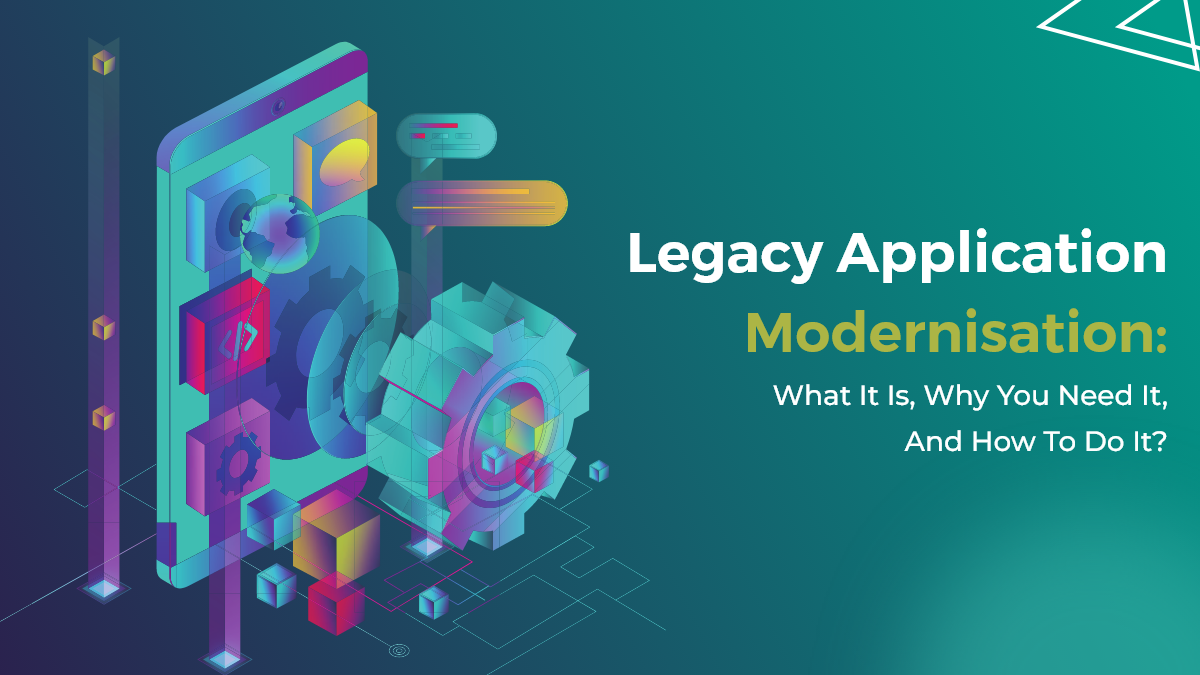
Mobile app development is quickly becoming a necessity for businesses. As the world becomes increasingly digital, companies of all sizes rely on mobile apps to reach customers and increase customer en

Picture this - a world where business transactions are seamless, secure, and transparent. This might have seemed like a distant dream before the advent of cryptocurrencies and blockchain technology, b

Is your business still relying on off-the-shelf software solutions that don’t efficiently meet your unique business requirements? If your mind instantly says yes, then let’s explore why in
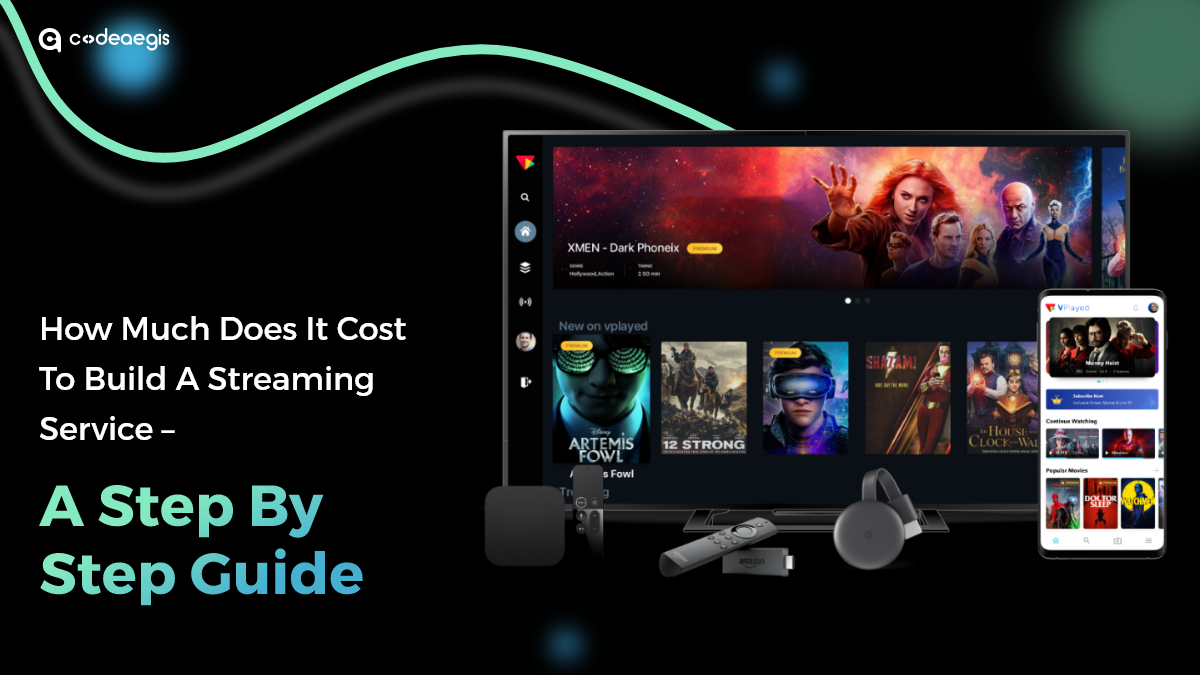
The rise of online video streaming services has revolutionized the entertainment industry, prompting businesses worldwide to explore the possibility of launching their own platforms. With giants like

If you’re in the healthcare industry, then you know that data privacy and security are of utmost importance. In order to protect patients’ information, the Health Insurance Portability and

As the world of startups becomes increasingly competitive, building an MVP is crucial for entrepreneurs looking to test their ideas and launch successful businesses. By creating a minimum viable produ

The mobile app market has grown to a staggering size, with over 1.8 million apps available in the Google Play Store and Apple App Store combined. Mobile apps have become a necessity for people worldwi

An extensive background working in Tech, Travel, and Education Industries. Currently involved in entire business operations process: Benefits strategy and implementation, systems integration, Human Re

Technology has come a long way in the past decade, and augmented reality (AR) is one of the most exciting development fields. AR technology superimposes digital content into the real world, creating a

Table of Contents 1. What is ChatGPT? 2. What Are the Top Benefits of ChatGPT? 3. How Does ChatGPT Work? 4. Challenges With ChatGPT 5. ChatGPT and the Future of AI 6. Final Thoug

Having a mobile application is no longer a luxury—it's an essential tool for instantly capturing the market! To stand out in the rental businesses, a company must adopt tech-driven preferences

If you’re planning to enter the fast-growing fantasy sports market, one of the most critical aspects considered is “What will it cost to build a fantasy sport that stands out and drives t
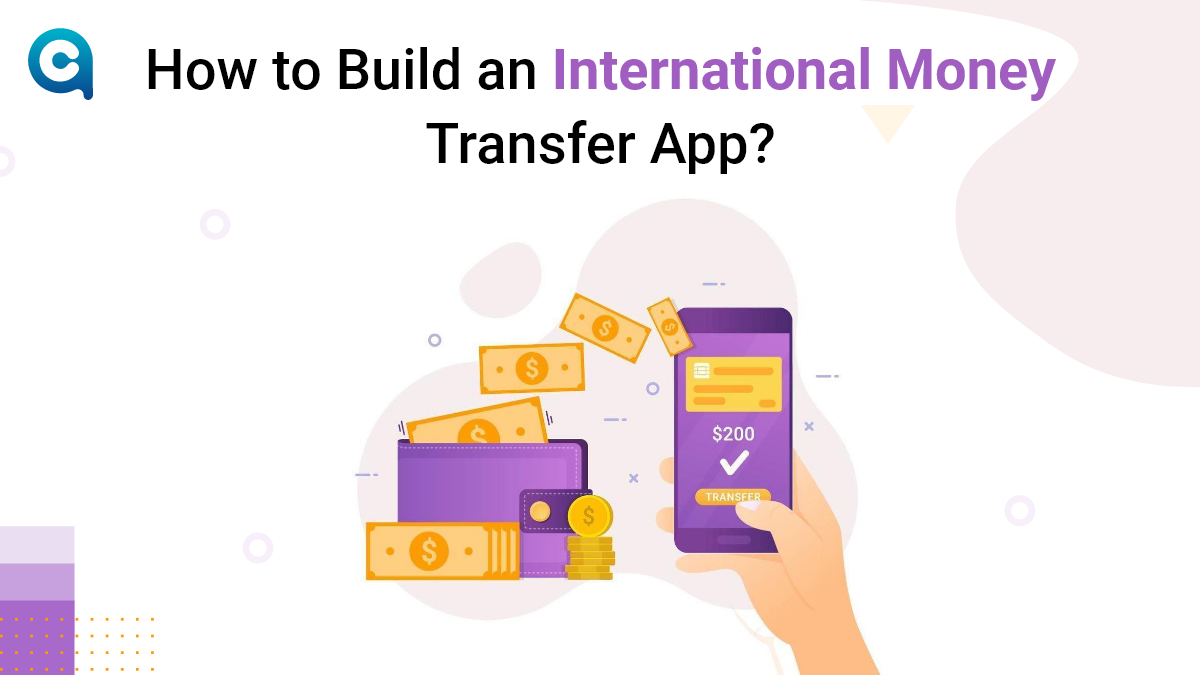
The introduction of online payment applications has changed how people perform financial transactions. A mobile phone with a banking app lets you quickly resolve various financial matters. Ta

The United Arab Emirates (UAE) is flourishing as the hub for blockchain technologies, transforming the digital ecosystem and having a forward-thinking government to maintain its competitive edge. Gove

With the ubiquity of smartphones and tablets, it only makes sense that mobile app development - which is the process of creating applications for smartphones and tablet devices - is becoming more popu
Have you ever felt like you’ve attracted 30% more consumers to your shopping sales by using a technical hack to revive your shops? It would work like a person was crossing through next to your

The world is digitizing at a very rapid pace, and in such a scenario, real estate businesses must also go digital to stay ahead of the competition. One of the best ways to digitize your business is de

By 2024, we all know that technology will be the future. What excites me the most is that technology has covered all the dimensions of businesses, enabling them to attain their potential and efficienc

Hiring a team of remote developers can be a daunting task, but it doesn't have to be. With a little bit of planning and the right approach, you can find the perfect candidates to build your dream prod

Imagine a world where you can speak your thoughts and desires, and the digital realm responds promptly, seamlessly integrating into your daily life. Whether you want to search for information, contro

It's no secret that the digital world has transformed many aspects of our lives, and it is only going to continue changing in ways we can't even imagine yet. To help businesses keep up with this rapid
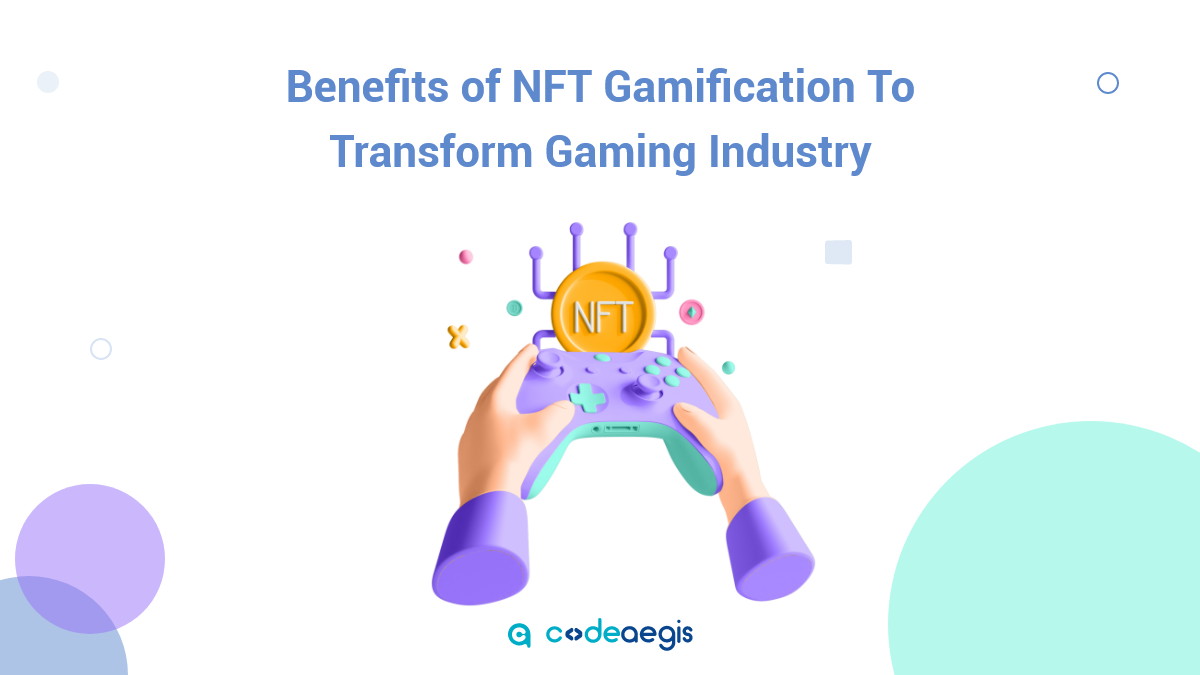
In recent years, the gaming industry has seen a surge in popularity, with many gamers turning to online gaming platforms and console games in order to escape reality. With so many people playing video

The healthcare industry is one of the most rapidly changing and growing industries worldwide. Mobile devices and apps have drastically changed how providers and patients interact and communicate.So, i

Necessity is the mother of invention origin! Have you ever wondered when an entrepreneur decides to start a business? When demand is high and supply is low, opportunities arise. But there’s mor

DeFi is a new kind of investment that’s taking the world by storm. So what is it? Essentially, DeFi is a digital asset class that allows you to invest in cryptocurrencies and other digital asset

Blockchain technology is becoming the heart of multiple industries. It is robustly securing businesses through its core value, making it the first pick-up in the generative AIs. The blockchain is the
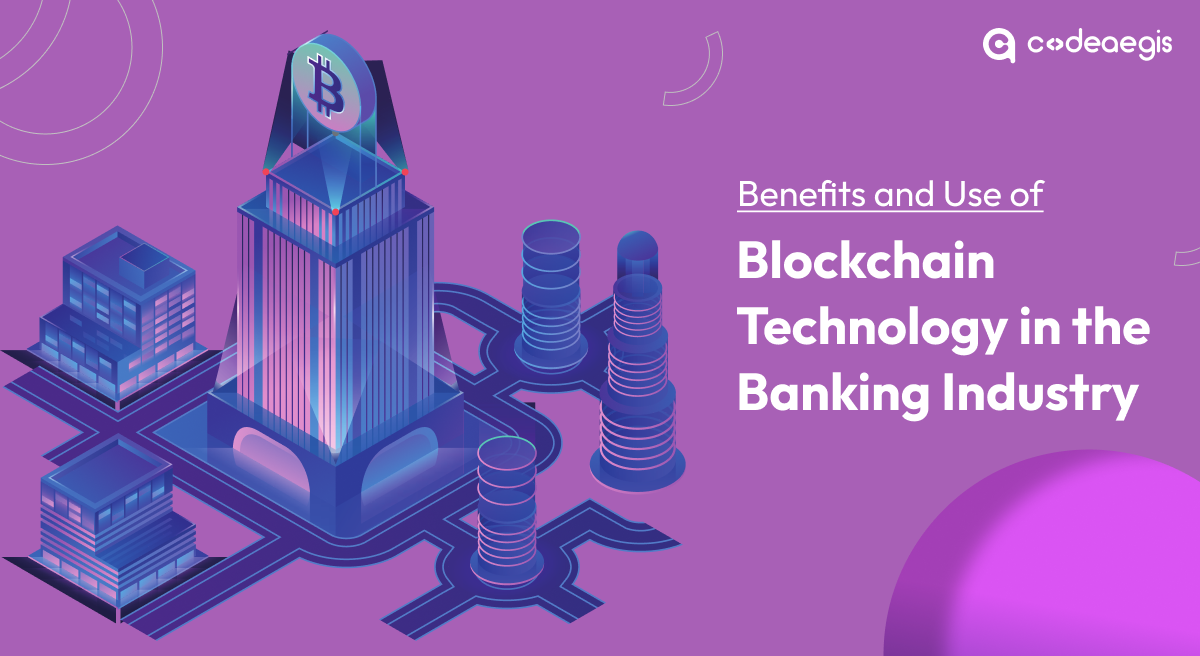
Picture this: a world where traditional banking transforms into a cutting-edge, efficient, and transparent system that leaves everyone in awe. Blockchain, often met with skepticism and uncertainty, is
Leave a Reply
Your email address will not be publishedDO YOU HAVE ANY PROJECT
Let's Talk About Business Solutions With Us
India Address
57A, 4th Floor, E Block, Sector 63, Noida, Uttar Pradesh 201301
Call Us
+91 853 500 8008
Email ID
[email protected]





.jpg)





